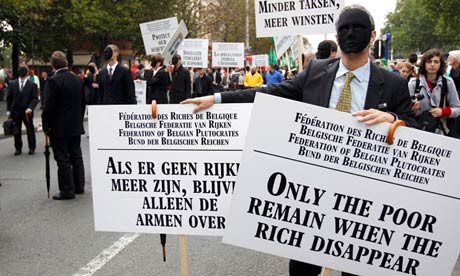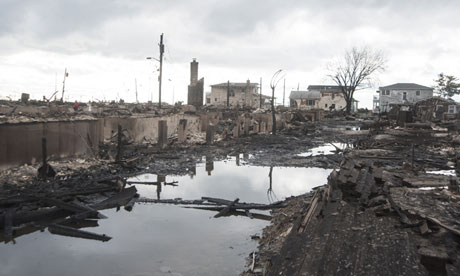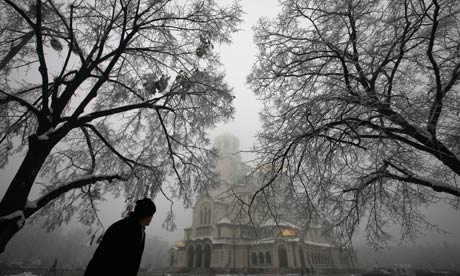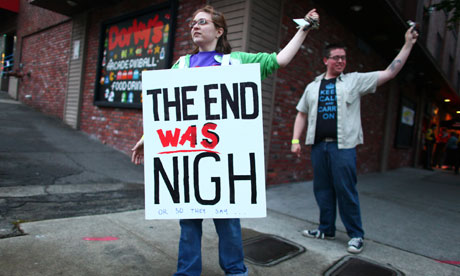In recent years, we atheists have become more confident and
outspoken in articulating and defending our godlessness in the public
square. Much has been gained by this. There is now wider awareness of
the reasonableness of a naturalist world view, and some of the
unjustified deference to
religion has been removed, exposing them to much needed critical scrutiny.
Unfortunately,
however, in a culture that tends to focus on the widest distinctions,
the most extreme positions and the most strident advocates, the
"moderate middle" has been sidelined by this debate.
There is a perception of unbridgeable polarisation,
and a sense that the debates have sunk into a stale impasse, with the
same tired old arguments being rehearsed time and again by protagonists
who are getting more and more entrenched.
It is time, therefore, for those of us who are tired of the status quo to try to shift the focus of our public discussions of
atheism
into areas where more progress and genuine dialogue is possible. To
achieve this, we need to rethink what atheism stands for and how to
present it. The so-called "new atheism" may have put us on the map, but
in the public imagination it amounts to little more than a caricature of
Richard Dawkins, which is not an accurate representation of the terrain
many of us occupy. We now need something else.
This manifesto is
an attempt to point towards the next phase of atheism's involvement in
public discourse. It is not a list of doctrines that people are asked to
sign up to but a set of suggestions to provide a focus for debate and
discussion. Nor is it an attempt to accurately describe what all
atheists have in common. Rather it is an attempt to prescribe what the
best form of atheism should be like.
1 Why we are heathens
It
has long been recognised that the term "atheist" has unhelpful
connotations. It has too many dark associations and also defines itself
negatively, against what it opposes, not what it stands for. "Humanist"
is one alternative, but humanists are a subset of atheists who have a
formal organisation and set of beliefs many atheists do not share.
Whatever the intentions of those who adopt the labels, "rationalist" and
"bright" both suffer from sounding too self-satisfied, too confident,
implying that others are irrationalists or dim.
If we want an
alternative, we should look to other groups who have reclaimed mocking
nicknames, such as gays, Methodists and Quakers. We need a name that
shows that we do not think too highly of ourselves. This is no trivial
point: atheism faces the human condition with honesty, and that requires
acknowledging our absurdity, weakness and stupidity, not just our
capacity for creativity, intelligence, love and compassion. "Heathen"
fulfils this ambition. We are heathens because we have not been saved by
God and because in the absence of divine revelation, we are in so many
ways deeply unenlightened. The main difference between us and the
religious is that we know this to be true of all of us, but they believe
it is not true of them.
2 Heathens are naturalists
Heathens
are not merely unbelievers: we believe many things too. Most
importantly, we believe in naturalism: the natural world is all there is
and there is no purposive, conscious agency that created or guides it.
This natural world may contain many mysteries and even unseen
dimensions, but we have no reason to believe that they are anything like
the heavens, spirit worlds and deities that have characterised
supernatural religious beliefs over history. Many religious believers
deny the "supernatural" label, but unless they are willing to disavow
such beliefs as in the reality of a divine person, miracles,
resurrections or life after death, they are not naturalists.
3 Our first commitment is to the truth
Although
we believe many things about what does and does not exist, these are
the conclusions we come to, not the basis of our worldview. That basis
is a commitment to see the world as truthfully as we can, using our
rational faculties as best we can, based on the best evidence we have.
That is where our primary commitment lies, not the conclusions we reach.
Hence we are prepared to accept the possibility that we are wrong. It
also means that we respect and have much in common with people who come
to very different conclusions but have an equal respect for truth,
reason and evidence. A heathen has more in common with a sincere,
rational, religious truth-seeker than an atheist whose lack of belief is
unquestioned, or has become unquestionable.
4 We respect science, not scientism
Heathens
place science in high regard, being the most successful means humans
have devised to come to a true understanding of the real nature of the
world on the basis of reason and evidence. If a belief conflicts with
science, then no matter how much we cherish it, science should prevail.
That is why the religious beliefs we most oppose are those that defy
scientific knowledge, such as young earth creationism.
Nonetheless,
this does not make us scientistic. Scientism is the belief that science
provides the only means of gaining true knowledge of the world, and
that everything has to be understood through the lens of science or not
at all. There are scientistic atheists but heathens are not among them.
Science is limited in what it can contribute to our understanding of who
we are and how we should live because many of the most important facts
of human life only emerge at a level of description on which science
remains silent. History, for example, may ultimately depend on nothing
more than the movements of atoms, but you cannot understand the battle
of Hastings by examining interactions of fermions and bosons. Love may
depend on nothing more than the physical firing of neurons, but anyone
who tries to understand it solely in those terms just does not know what
love means.
Science may also make life uncomfortable for us. For
example, it may undermine certain beliefs about free will that many
atheists have relied on to give dignity and autonomy to our species.
Heathens
are therefore properly respectful of science but also mindful of its
limits. Science is not our Bible: the last word on everything.
5 We value reason as precious but fragile
Heathens
have a commitment to reason that fully acknowledges the limits of
reason. Reason is itself a multi-faceted thing that cannot be reduced to
pure logic. We use reason whenever we try to form true beliefs on the
basis of the clearest thinking, using the best evidence. But reason
almost always leaves us short of certain knowledge and very often leaves
us with a need to make a judgment in order to come to a conclusion. We
also need to accept that human beings are very imperfect users of
reason, susceptible to biases, distortions and prejudices that lead even
the most intelligent astray. In short, if we understand what reason is
and how it works, we have very good reason to doubt those who claim
rationality solely for those who accept their worldview and who deny the
rationality of those who disagree.
6 We are convinced, not dogmatic
The
heathen's modesty about the power of reason and the certainty of her
conclusions should not be mistaken for a shoulder-shrugging agnosticism.
We have a very high degree of confidence in the truth of our
naturalistic worldview. But we do not dogmatically assert it. Being open
to being wrong and to changing our minds does not mean we lack
conviction that we are right. Strength of belief is not the same as
rigidity of dogma.
7 We have no illusions about life as a heathen
Many
people do not understand that it is possible to lead a meaningful,
happy life as a heathen, but we maintain that it is and can point to any
number of atheist philosophers and thinkers who have explained why this
is so. But such meaning and contentment does not inevitably follow from
becoming a heathen. Ours is a universe without guarantees of redemption
or salvation and sometimes people have terrible lives or do terrible
things and thrive. On such occasions, we have no consolation. That is
the dark side of accepting the truth, and we are prepared to acknowledge
it. We are heathens because we value living in the truth. But that does
not mean that we pretend that always makes life easy or us happy. If
the evidence were to show that religious people are happier and
healthier than us, we would not see that as any reason to give up our
convictions.
8 We are secularists
We
support a state that is neutral as regards people's fundamental
worldviews. It is not neutral when it comes to the shared values
necessary for people of different conviction to live and thrive
together. But it should not give any special privilege to any particular
sect or group, or use their creeds as a basis for policy. Politics
requires a coming together of people of different fundamental
convictions to formulate and justify policy in terms that all
understand, on the basis of principles that as many as possible can
share.
This secularism does not require that religion is banished
from public life or that people may not be open as to how their faiths,
or lack of one, motivate their values. As long as the core of the
business of state is neutral as regards to comprehensive worldviews, we
can be relaxed about expressions of these commitments in society at
large. We want to maintain the state's neutrality on fundamental
worldviews, not purge religion from society.
9 Heathens can be religious
There
are a small minority of forms of religion that are entirely compatible
with the heathen position. These are forms of religion that reject the
real existence of supernatural entities and divinely authored texts,
accept that science trumps dogma, and who see the essential core of
religion in its values and practices. We have very little evidence that
anything more than a small fraction of actual existent religion is like
this, but when it does conform to this description, heathens have no
reason to dismiss it as false.
10 Religion is often our friend
We
believe in not being tone-deaf to religion and to understand it in the
most charitable way possible. So we support religions when they work to
promote values we share, including those of social justice and
compassion. We are respectful and sympathetic to the religious when they
arrive at their different conclusions on the basis of the same
commitment to sincere, rational, undogmatic inquiry as us, without in
any way denying that we believe them to be false and misguided. We are
also sympathetic to religion when its effects are more benign than
malign. We appreciate that commitment to truth is but one value and that
a commitment to compassion and kindness to others is also of supreme
importance. We are not prepared to insist that it is indubitably better
to live guided by such values allied with false beliefs than it is to
live without such values but also without false belief.
11 We are critical of religion when necessary
Our
willingness to accept what is good in religion is balanced by an
equally honest commitment to be critical of it when necessary. We object
when religion invokes mystery to avoid difficult questions or to
obfuscate when clarity is needed. We do not like the way in which
"people of faith" tend to huddle together in an unprincipled coalition
of self-interest, even when that means liberals getting into bed with
homophobes and misogynists. We think it is disingenuous for religious
people to talk about the reasonableness of their beliefs and the
importance of values and practice, while drawing a veil over their
embrace of superstitious beliefs. In these and other areas, we assert
the right and need to make civil but acute criticisms.
And
although our general stance is not one of hostility towards religion,
there are some occasions when this is exactly what is called for. When
religions promote prejudice, division or discrimination, suppress truth
or stand in the way of medical or social progress, a hostile response is
an appropriate, principled one, just as it is when atheists are guilty
of the same crimes.
12 This manifesto is less concerned with distinguishing heathens from others than forging links between us and others
Our
commitment to independent thought and the provisionality of belief
means that few heathens are likely to agree completely with this
manifesto. It is therefore almost a precondition of supporting it that
you do not entirely support it. At the same time, although very few
people of faith can be heathens, many will find themselves in agreement
with much of what heathens belief. This is what provides the common
ground to make fruitful dialogue possible: we need to accept what we
share in order to accept with civility and understanding what we most
certainly do not. This is what the heathen manifesto is really about.








 706 Comments
706 Comments